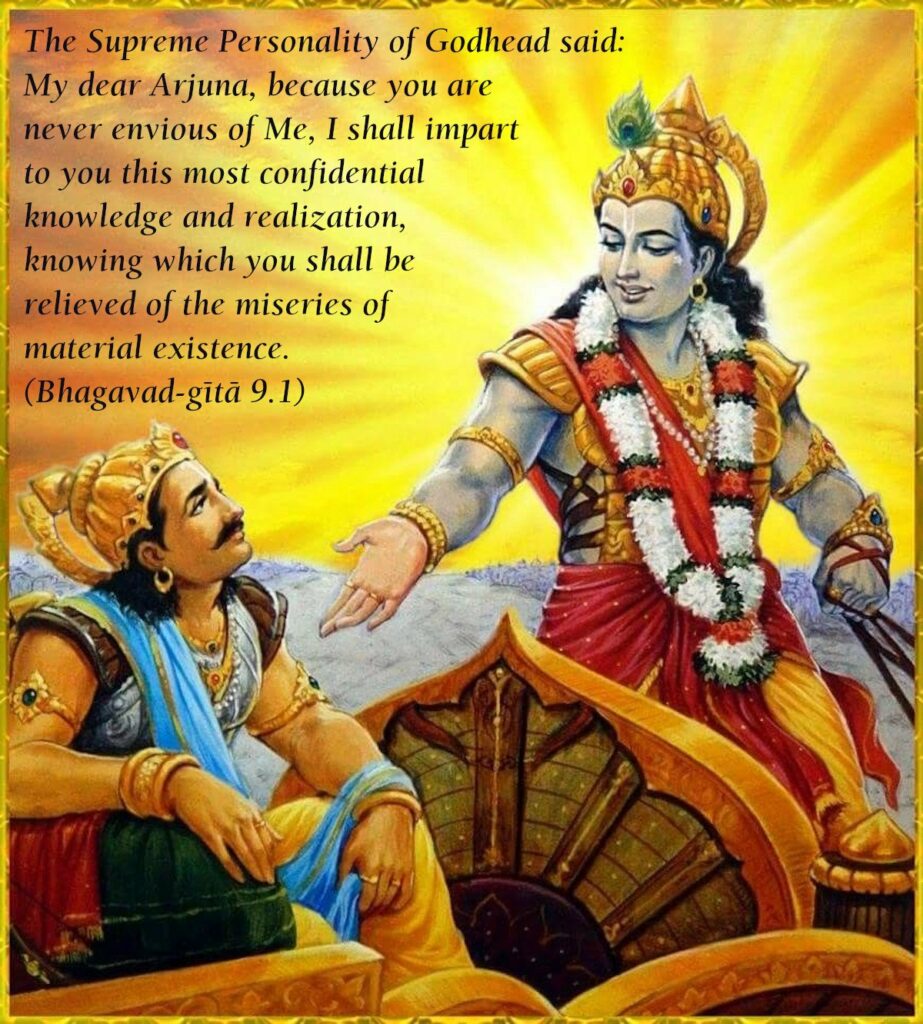श्रीभगवानुवाच |
इदं तु ते गुह्यतमं प्रवक्ष्याम्यनसूयवे |
ज्ञानं विज्ञानसहितं यज्ज्ञात्वा मोक्ष्यसेऽशुभात् || 1||
śhrī bhagavān uvācha
idaṁ tu te guhyatamaṁ pravakṣhyāmyanasūyave
jñānaṁ vijñāna-sahitaṁ yaj jñātvā mokṣhyase ’śhubhāt
śhrī-bhagavān uvācha—the Supreme Lord said; idam—this; tu—but; te—to you; guhya-tamam—the most confidential; pravakṣhyāmi—I shall impart; anasūyave—nonenvious; jñānam—knowledge; vijñāna—realized knowledge; sahitam—with; yat—which; jñātvā—knowing; mokṣhyase—you will be released; aśhubhāt—miseries of material existence
Translation:
The Lord said: To you, free from malice and cavil, I shall declare this profoundest secret, knowledge with experience combined, which having known, you shall be freed from all evil.
Commentary:
The Lord now teaches the highest knowledge (Atmajnana) and the profoundest secret (rajaguhyam) combined with direct practical experience. The word ‘guhyatamam’ indicates that the knowledge is the highest secret, beyond which there is nothing else to be known. The teaching of Brahmajnana is usually done to those who are qualified to receive it, or even to hear of it. What is that quality which entitles a person to hear and understand Brahmatatvam? The Lord answers it here by stating that Arjuna is free from malice (asuya). He is pure in heart and has the four qualities mentioned in the Sastras (sadhana chatushtaya). So the Lord reveals the supreme knowledge. Those who are eager to receive the knowledge from a Guru should first of all examine themselves and know fully well whether they are established in virtue and self-control. Brahmajnana will never reveal itself in the impure heart, whatever other things one may possess, power or position. These things do not qualify anyone to understand the Truth. The pure soul knows the secret and attains Brahman.
He who does not indulge in misrepresenting good to be bad, who commends even low forms of goodness in others, who does not delight in thinking of the evil in others in anasuya. Of all the host of bad qualities, envy is the leader. Like poisonous cancer, it permeates the whole mind, and pulls down the sadhaka from any merit which he might have acquired by austerity. Several aspirants have fallen on account of this evil. The Lord understands human nature so well that he fixes attention on that one evil which is the source of all other evils. He knows that the disciple is free from this evil, and so, he reveals the profoundest secret to him in perfect confidence. Every disciple should impress his Guru about the purity of the heart, and only then would the Guru teach the highest knowledge. The purer you are, the greater would be the confidence of the Guru in you. Such mutual understanding is necessary for transmitting Atmajnana.
Jnanam Vignanasahitam: The word jnanam stands for knowledge obtained by the study of the Sastras. This knowledge is indirect (paroksha). Vijnana means direct experience (aparoksha). When one hears of a country from a friend or reads of it in a book, his knowledge of the country is indirect (Paroksha) but when he visits the country and sees it for himself, his knowledge is direct (Aparoksha). Such is the difference between Jnana and Vijnana.
What is the fruit of Vijnana? The Lord says he who knows the truth directly is freed from all evil. What is this evil? It is samsara – the cycle of birth and death, with all the ills and sorrows of one’s ignorant life. Whatever is anatma comes under the delusive power of Maya. It is transient, incomplete, insipid, and appears to exist without any reality in it. Atma alone is subha (without evil). It is deathless, birthless, ever blessed, and blissful. So every seeker should follow the teaching of the Lord and rise to the plane of Atma.
Related Articles:
- Knowing which there shall not be any other to be known in this world, that Knowledge combined with experience, I will tell you. (BG 7.2)
Question: What is Brahmavidya?
Answer: It is the highest knowledge and the highest secret.
Question: Who receives the knowledge?
Answer: The man who is free from evil.
Question: What is the qualification for Brahma Vidya?
Answer: Purity of heart.
Question: What is this samsara?
Answer: It is Asubha (evil).
Question: How can man escape from samsara?
Answer: By possessing knowledge of Atma combined with experience.
Bhagavad Gita: Chapter 9 🔻 (34 Verses)
